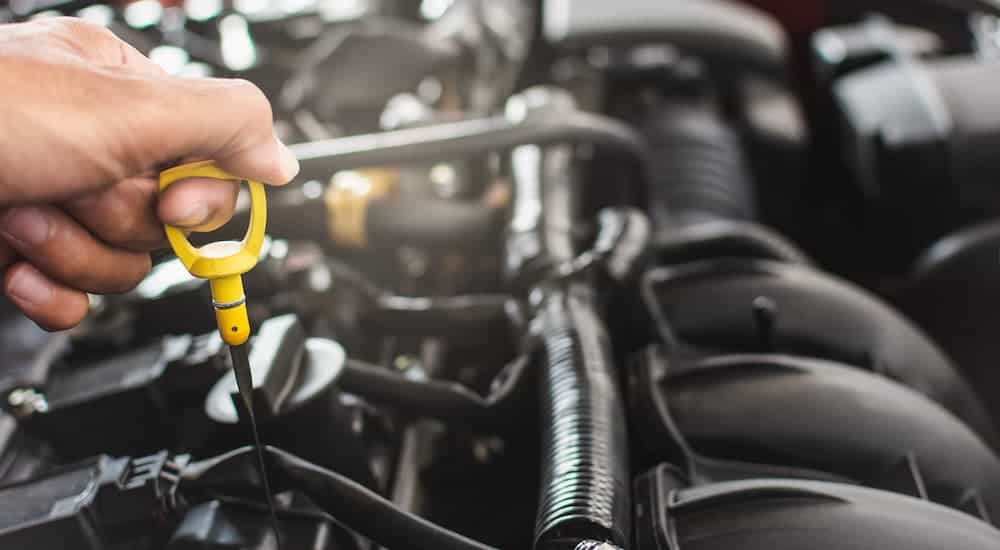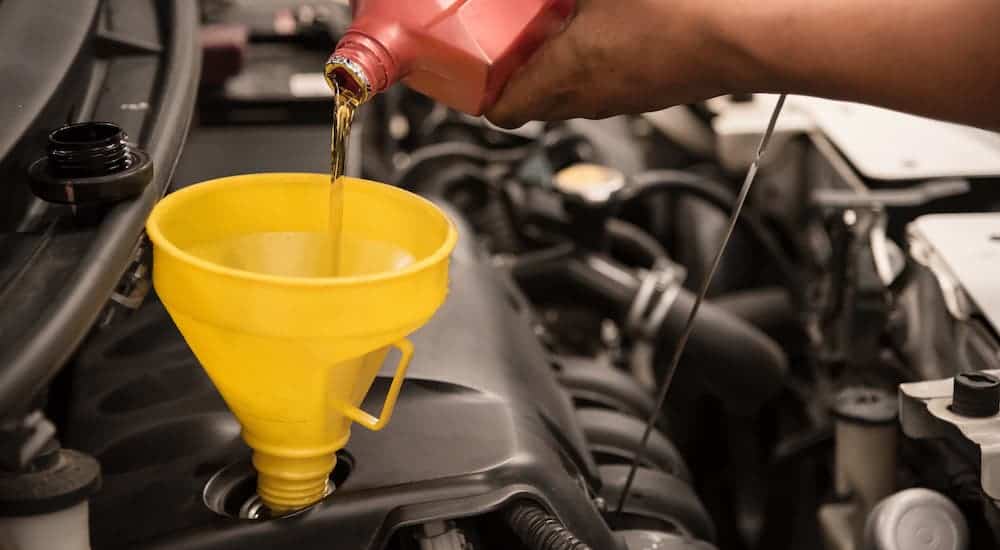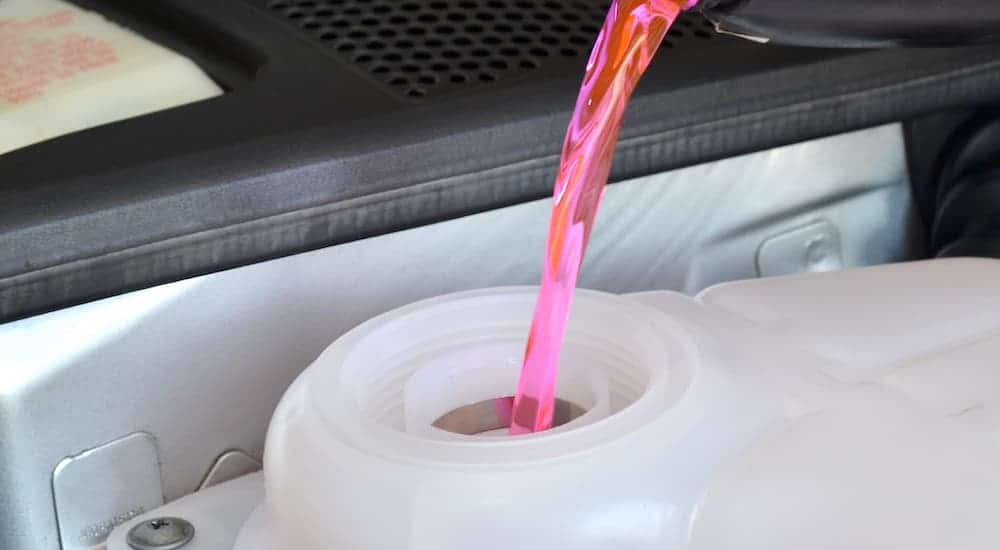It’s easy to look at your vehicle and see it as a complex series of moving parts perfectly in sync and in alignment with each other. To a certain extent, that’s true; but it’s also worth looking at your car in another way: as a series of tubes, lines, and chambers filled with fluids. From the hydraulic fluid in your brakes to the oil in your engine, these different fluids are all essential to ensure your vehicle keeps running smoothly. Knowing the different types of fluids in your vehicle and how often you should visit the Kings Ford service center to have them topped off or replaced can have a large effect on how your car runs.
Let’s take a look at some of the major types of fluids in your vehicle. We’ll talk about each one individually: go over what it does for your car, how important it is for your vehicle, and how often you should have it replaced. This will give you a good sense of where to start and when to schedule different types of service at Kings Ford.
But First, Replace or Flush?
Before we get into the specifics of the different fluids in your car, let’s take a moment to discuss replacing vs flushing your fluids. Replacing simply means that the fluid in a line or part of your vehicle is allowed to drain out, and then the new fluid is added. Flushing, on the other hand, means the fluid is drained and then flushed out to ensure all of the fluid is completely removed before new stuff is added.
Replacing your fluids is cheaper than flushing, so it’s often chosen for regular service, but it’s not as thorough. While flushing is more expensive, it works more effectively to keep your vehicle running well. Some people alternate replacing and flushing every other time they have fluid service done but talk to your service professional to see what they recommend.
Motor Oil
Few fluids in your vehicle are more important than your motor oil, which is responsible for keeping the moving parts of your engine sliding smoothly against each other. This lubricates your engine so that it doesn’t damage itself due to excess heat and friction while it runs. You can easily check your oil levels yourself, and it’s very important that you have sufficient amounts of oil in your vehicle – so check it regularly between service visits.
The old rule of thumb used to be to change your oil every 3,000 miles. However, with modern synthetic oils and modern engine designs, that’s not really accurate anymore, and you should check the owner’s manual for your vehicle to see how often the manufacturer suggests changing your oil. If you can’t find your owner’s manual, simply give the Kings Ford service center a call or send us an email, and we will provide you with the information you need.
Transmission Fluid
Much like how engine oil lubricates your engine to keep things running smoothly, your transmission fluid lubricates the gears and other parts to ensure your transmission is smooth and running perfectly. Over time, the transmission fluid can get just as gunked up as your engine oil with particulates that can make it thick and sludgy. It’s harder to check your transmission fluid, but ignoring issues with your transmission can lead to very expensive repairs.
Check your owner’s manual for when to change your transmission fluid, which will usually be between every 30,000 to 60,000 miles. However, some systems can go more than 100,000 miles without changing transmission fluid, so make sure you know what your car needs.
Brake Fluid
Your brake fluid is responsible for creating hydraulic pressure when you press down on the brake pedal. This pressure is used to apply much more force to your brakes than you directly apply to the pedal, so you press down lightly, and the shoes or pads on your brakes press with tremendous force to slow and stop your vehicle. Over time, copper and moisture will build-up in your brake fluid and make it work less effectively.
In general, you should replace your brake fluid about every two years. However, it’s a good idea to have the fluid checked whenever you need other work done on your brakes, like having the pads replaced.
Power Steering Fluid
While fewer modern cars have power steering fluid, it was pretty universal in the past, and there’s a good chance your car does. This fluid helps make steering easier, kind of like how brake fluid lets you apply less pressure and still slow down. Power steering fluid lets you put less force into the steering wheel while still providing sufficient force to your wheels for turning. Newer systems use electronic power steering, which uses a small electric motor rather than a hydraulic system.
If you have power steering fluid, then consider having it changed between 50,000 to 100,000 miles. However, you should always check your owner’s manual to see what it recommends.
Engine Coolant
Even with motor oil, your car’s engine still builds up a tremendous amount of heat when you’re driving. Your engine coolant – located in the radiator – helps move that heat out of the engine so it can stay at a reasonable temperature and not destroy itself. While the exact composition depends on your vehicle, this coolant is generally a mixture of purified water and antifreeze.
Be sure to check your owner’s manual for what fluid you should use as engine coolant and how often you should replace it. If your car is overheating, then you probably need to add more coolant. If this is a recurring problem, then it’s time to come in for service at Kings Ford.
Differential Fluid
The differential of your vehicle is what takes the torque from your engine and transmission and sends it to the wheels of your vehicle. Different cars have different differential setups, depending on if you have rear-wheel drive, front-wheel drive, all-wheel drive, or four-wheel drive. No matter what kind of vehicle you have, however, you have differential fluid that needs to be changed occasionally.
In general, start thinking about changing your differential oil somewhere between about 30,000 and 60,000 miles – though it can last longer if you use synthetic gear oil and drive a lighter vehicle. As always, check your owner’s manual to see what your car’s manufacturer recommends.
Windshield Washer Fluid
While your windshield washer fluid might not be as important as something like motor oil – since your engine won’t turn into a block of scrap if you lack it – it’s still worthwhile. Keeping your washer fluid reservoir full will ensure it’s always there when you need it, like when that big bug slams into your windshield on the highway.
There are no clear rules on when to change your washer fluid; you simply want to check it every month or two and refill it as needed. Since it gets mighty cold around Cincinnati, make sure you choose wiper fluid that doesn’t freeze too easily. Consider de-icing fluid to help keep your windshield clear of frost and ice for winter driving.
Kings Ford Quick Lane is Here for You
Whether you know it’s time for a fluid change, you hear a weird noise that you’re worried about, or you have any other vehicle needs, we’re here to help. Just remember that your car’s owner’s manual is often the best resource for figuring out when you need service for your vehicle. Call or come visit us at Kings Ford Quick Lane today to replace or flush any vehicle fluid, for new tires, or for any other service and maintenance you need.



